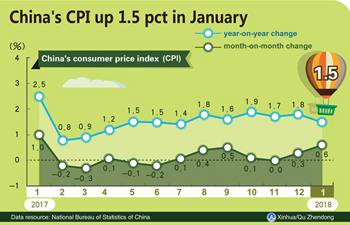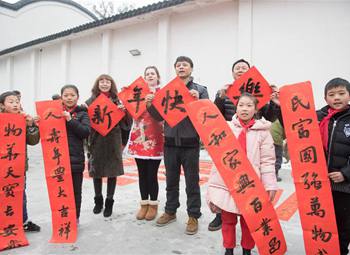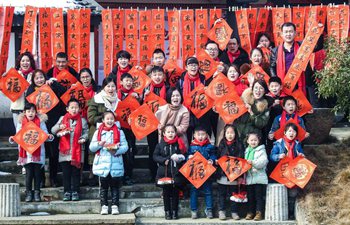ZHENGZHOU, Feb. 9 (Xinhua) -- Cong Xinshan, 76, moved to a two-bedroom apartment in town at the end of last year. His old house in the country has been demolished and crops are to be planted on the site in the spring.
"With a gas stove and flush toilet, we are very happy to have started our 'urban life'," said Cong, from Dancheng, a poor county in central China's Henan Province.
Cong and his wife are among nearly 20 households of left-behind elderly folks who were moved to new apartment buildings and are about to grow crops on the sites of their former houses.
With most people of working age off in the cities, the village, like many others across the country, is almost deserted. The few who remain are often housed in shabby old buildings.
"The whole place was overgrown. Weeds were everywhere and we could barely hear a cock crow," Cong recalled.
Turning deserted rural housing into farmland in Dancheng County is part of the "land reclamation coupon" system in Henan Province to make better use of land and secure the amount of arable land.
County governments which reclaim arable land from the sites of former houses are given coupons representing the amount of "construction" land converted to farmland. These coupons may then be sold to cities in the province, which can use the same amount of farmland within their jurisdiction for building.
Yang Yumin, head of Dancheng County land resources bureau, said the county organized the relocation with the agreement of the villagers and the reclaimed farmland remained contracted to the villagers themselves.
By demolishing "ghost villages' and building apartment buildings, the county reclaimed 567 hectares of farmland in the past year.
Coupons for around 140 ha were sold for up to 4.5 million yuan (about 710,000 U.S. dollars) per ha to the provincial capital Zhengzhou, which will be allowed to develop 140 ha for commercial use.
Part of the revenue is used to cover the cost of new apartments for villagers like Cong.
The county has 340 such villages, covering over 3,000 ha, according to Yang.
The "No. 1 central document" released Sunday encouraged county governments to optimize village layouts to make better use of construction land in rural areas.
China has set a red line of 120 million ha to ensure food security.
Chen Zhisheng, deputy chief of Henan provincial bureau of land resources, said the coupon system, launched in late 2016, had seen trades of 4,000 ha by the end of 2017, with most coupons sold from poor counties to cities.
Total revenue reached 13 billion yuan, which is very helpful for poverty-stricken counties, according to Chen.
"The system not only reactivates deserted land in rural area, but also offers space for urban development," he said.

















